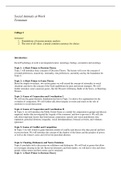Social Animals at Work
Tentamen
College 1
Literatuur:
1. Foundations of neuroeconomic analysis
2. The root of all value: a neural common currency for choice
Introduction:
Social Psychology at work is an integrated course: neurology, biology, economics and sociology
Topic 1: A Short Primer to Decision Theory
Topic 1 will introduce basic concepts of Decision Theory. The lecture will cover the concept of
revealed preferences, transitivity, rationality, risk preferences, and utility and lay the foundation for
Topic 2.
Topic 2: A Short Primer to Game Theory
Based on simple two-player, two-action games we will extend the concept of rationality to social
situations and derive the concept of the Nash equilibrium for pure and mixed strategies. We will
further introduce some canonical games, like the Prisoner's Dilemma, Battle of the Sexes, or Matching
Pennies.
Topic 3: Games of Cooperation and Coordination I
We will use the game-theoretic foundation laid out in Topic 2 to derive five explanations for the
evolution of cooperation. We will further talk about inequity aversion and touch on the role of
emotions in social interactions.
Topic 4: Games of Cooperation and Coordination II
In Topic 4, we will introduce the Public Goods Game as a model for cooperation in groups and discuss
empirical studies that investigated the 'tragedy of the commons' and how to prevent it. We will also
talk about important factors that limit human cooperation, namely anti-social punishment, fake
reputation, parochial altruism, inequality, social interdependence, betrayal aversion, and voluntary
ignorance.
Topic 5: Games of Conflict and Competition
In Topic 5 we will switch to game-theoretic models of conflict and discuss why they prevail and how
to prevent them. We will introduce the concept of the shadow of the future and the paradox of power,
as well as the winner's curse and will revisit parochial altruism.
Topic 6: Cheating, Dishonesty and Norm-Violations
Topic 6 concludes with a discussion on selfishness and dishonesty. We will look at games that allow
to investigate cheating in the lab. Based on laboratory and field studies, we will derive why and when
people violate norms and how norms can be sustained
Topic 1: A Short Primer to Decision Theory
,Topic I: A Short Primer to Decision Theory
Many daily decisions have the same structure.
If person X choses the apple over the orange, we can assume the person
prefers the apple over the orange in this moment. (The observation reveals
preferences).
Rationality in decision theory:
Based on diffefent axioms
1. weak axiom of revealed preferences (WARP)
Someone should prefer A over B, B over A, or be indifferent
You cannot prefer A over B and at the same time prefer B over A
2. Transitivity Axiom (SARP)
If you have a choice pattern that is transitive and doesn’t violate the axioms, we can assume
that the person X has a preference ranking. Decisions would be following this ranking.
Violations of GARP is called ‘the money pump’. People with intransitive preferences are to
some degree exploitable.
,When a chooser chooses rationally?
– Preferences can be ordered from low to high
– Decisions can be characterized as if the decision maker would maximize ‘utility’
History of Utility
Jeremy Bentham (1748-1832)
“Nature has placed mankind under the governance of two sovereign
masters, pain and pleasure. It is for them alone to point out what we
ought to do, as well as to determine what we shall do.”
(p.1, The Principles of Morals and Legislation, 1789)
All animals and humans are the same in the way that they want to
maximize pleasure (happiness) and minimize pain (suffering). This was a
revolutionary thought because it means that all humans have equal wants
and needs. (in this era, slavery was still a common practice)
• “Principle of Utility”
• “Hedonic Calculus”
• Cardinal concept of Utility
Utility according to Bentham = happiness, satisfaction and pleasure
Utility can be seen as a universal currency for decision theory and policy making
→ Humans make decisions based on maximizing their utility if they are rational
Blaise Pascal (1623-1662)
When you want to take a gamble, you should look at the expected value.
Nicolaus Bernoulli (1687 – 1759)
Bernoulli’s Solution to the paradox
The determination of the value of an item must not be based on the price, but rather on the
utility it yields. […] There is no doubt that a gain of one thousand ducats is more significant
to the pauper than to a rich man though both gain the same amount.
, Expected Utility Theory
EU(x) = p x U(x)
How it works:
Most people like to choose B in this case.
Because of the Concave Utility Function, for
gamble B the expected utility outcome is 40
and for gamble A the expected utility
outcome is 29.
Preferences for risk
Risk neutral: the idea of Pascal (you would be indifferent for A and B)
Note: From a normative perspective, all of these risk preferences are rational, because they do not
violate the assumption we talked about earlier. You can argue risk aversion and neutral is better than
the seeking because risk seekers have a bigger chance of gambling their money away. Risk averse
people might lose out on good options because they don’t want to take a chance.





